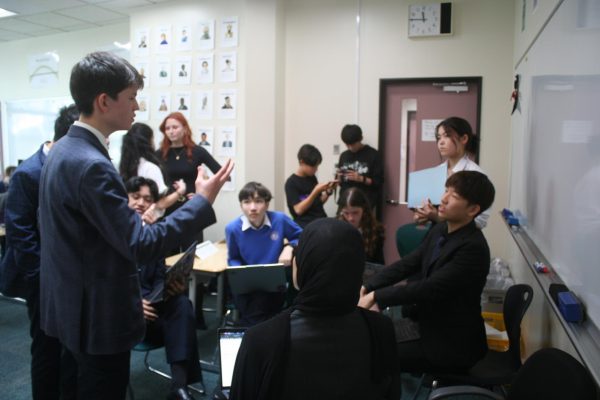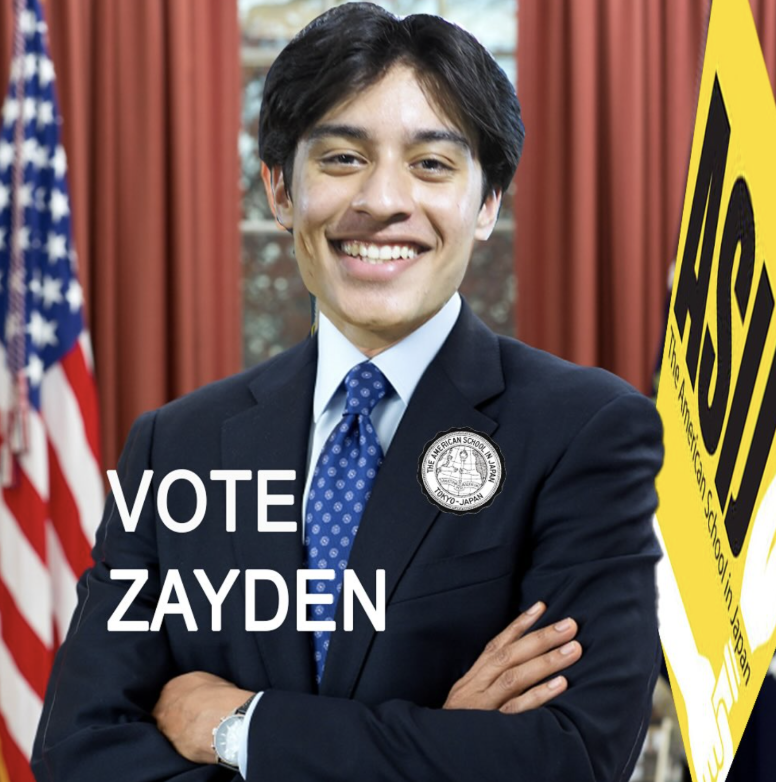Your Guide to Classroom Etiquette

November 30, 2021
Have you ever forgotten an assignment was due? Been a bit too late to class? Despite the relative frequency of these situations, there are no clear-cut answer sheets to help high school students navigate the inevitable awkwardness. Are apologies expected? Should you act like nothing happened?
To answer these questions, we asked teachers from every core subject what they thought about manners in high school classes, or “classroom etiquette.” Here’s what they have to say.
Classroom Etiquette: Extensions
Ms. Apel:
I feel like if it’s due to an absence, [the extension] should be the number of days [the student] was absent—they have that amount of time to make it up. If it’s where they have three major assessments in a day, and they have to reassess for that, I personally like it to be within that week.
Mr. Venhuis:
For me it’s really dependent on what the assignment is and when they’re asking me. The biggest thing is asking ahead of time. If it’s a bigger assignment I’ll probably be able to give them more time because I won’t be able to mark them as fast. I’m fairly lenient to be honest; I’m looking at a weekend. I want to be able to give you that weekend because I know that if it’s due on a Wednesday, that’s just going to kibosh you for everything in the next five days.
 Ms. Thiel:
Ms. Thiel:
I think it varies based on what the assignment or assessment is. In general if there’s something more dire like a family emergency, I try to be mindful about how disruptive that could be in a student’s life, so I’d probably be a bit more generous in giving extension time for something to be completed. If someone just didn’t manage their time very well and they’re asking for the extension at the last minute, usually the extension will get granted, but it may not be as lengthy, and it would turn into a learning moment.
 Ms. Krauth:
Ms. Krauth:
There are a few reasons for my policy on extensions: time management is important as a student and turning your work in on time is very important, even if it is not 100 percent perfect. Also, when an extension is given, it also doesn’t really help the student with managing other current and upcoming work. Of course, there are very, very good reasons for extensions but those are usually on a case-by-case basis.
 Ms. Carreon:
Ms. Carreon:
Within a couple of days is probably an appropriate extension. More important is that you communicate with the teacher ahead of the due date that you’re going to be struggling with this to show you have good time management skills, and that, when you do set a time to turn it in, you actually honor that second commitment. I think it’s very frustrating for teachers to have to chase kids down for assignments… it’s always better to be open and honest with the teacher.

Mr. Welckle:
We’re now at a point where it’s not so much “did you hit the deadline,” but “what’s the pattern.” If every time I have an assignment, you turn it in late, then that’s a different issue. If it’s one off, I usually say, “well, you tell me — when can you get it in?” I know kids are busy. The one that I don’t like when they ask for extension the night before, or literally the day of. If it just feels genuine, I can’t think of a time where I wouldn’t say yes to it, unless I saw the pattern; you always advocate for yourself.
 Ms. Cancella:
Ms. Cancella:
I think emailing the teacher as soon as they realize [they can’t turn it in on time] is really helpful, because the teacher can be very strategic about possibly saying, “look you can’t do all of it, try to get to this part.” While some homework is reinforcement to keep students’ skills fresh, sometimes that homework is really important for what the class is going to be doing together.
 Ms. Cokerdem:
Ms. Cokerdem:
In general, notify a teacher as soon as you know. The sooner the better. In general, write an email to your teacher explaining the circumstances. If it’s the first time, I’m probably going to give more leeway to any student who has turned everything else in on time. If the same student is frequently asking for an extension, then I’ll probably be more strict.
 Mr. Hertrick:
Mr. Hertrick:
So much of [extensions] are context-specific. I think about the reasons that you’re needing that extension, when you’re asking for the extension, what the function of that project is; all of those pieces kind of factor into that. I want students to realize they are making a request. Sending an email, or even better, talking face to face, trying to make sure you’re communicating clearly why it’s necessary for you to have an extension.
Classroom Etiquette: Late to class
Ms. Apel:
Usually some kind of group work is happening, so [students] can get caught up with their peers, or if I’m doing a directed instructional [lesson], they can just hop in.
Mr. Venhuis:
Come in and get down to business. Don’t make a scene!
Ms. Thiel:
They shouldn’t be late! If your teacher is there to start class at a certain time—not to say that we’re always on time — the expectation is that you’re ready to work when class starts, not scooting into the door right when class is supposed to start.
Ms. Krauth:
Students should come and talk to the teacher directly if they are just a few minutes late and give a true and honest reason. If it is more than a few minutes, students should get a pass from the office.
Ms. Carreon:
If a student is late, the worst thing a student can do is walk in and interrupt the flow of the class. I think the best thing they can do is quietly enter and put their bags down quietly and just get to work. And then maybe a little bit later, when there’s a natural break, say, “I’m sorry I was late.”
Mr. Welckle:
It happens a lot at ASIJ. I hate when [students] think they can be late all the time. Well, now you’re just abusing it. If you’re late because you had something, it’s fine, thank you for saying you’re sorry, but just sit down and that’s fine. I don’t mind lateness if it’s one off. If they know their relationship with me is, “well, I almost never do this,” then just sit down and it’s fine, and maybe after class say, “I’m sorry.”
Ms. Cancella:
I think if the students are working on something, they can come up and say, “Is there anything I need?” if I’m not actively involved with someone. Entering in a way that is as seamless as possible, limiting distraction is the best way to go about it. I don’t need an apology, but it would be nice if they, at some point, gave context as to why they were late.
Ms. Cokerdem:
An apology is generally nice. But if there’s something already going on in class, then a quiet entrance would be best, with an apology later.
Mr. Hertrick:
We’re fortunate in that we’ve got windows on the doors, and I think seeing what’s happening — taking a moment before you open the door—to see what’s going on, to think about how you can best enter that room, is part of it. It’s frustrating when a student sits down and is totally passive, without acknowledging the fact that they don’t know what they’re supposed to be doing. Taking responsibility for the fact that you’ve missed some of the instructional content […] would make a big difference for me.
Classroom Etiquette: Forgetting to submit assignments
Ms. Apel:
Email me and let me know that you forgot. What’s important to me is that [the work] gets done and that you are showing knowledge.
Mr. Venhuis:
Be honest: I missed it because of this or I’m not going to make it because of this. I appreciate openness and communication.
Ms. Thiel:
If you submit past the deadline, then you have to expect to receive your feedback later than your peers. If I have straggling papers coming in a few days or a week later, it’s just harder for me to manage.
Ms. Krauth:
The cynical teacher in me doesn’t see a very high possibility of “forgetting” to submit an assignment: between Edsby, classmates, and friends, everyone should know when everything is due. However, if a student really does “forget,” that student should talk to the teacher directly, face to face.
Ms. Carreon:
As soon as they remember, they should submit and then send an email to their teacher. Even though teachers can seem scary, I think most teachers — when students approach them honestly and openly — the teacher will believe them.
Ms. Cokerdem:
That happens in almost every project. Usually in the beginning of class, I’ll say “Oh, these people haven’t submitted.” I’ll walk over, and if they’ve done it, it’s “Oh my gosh, here it is,” hit submit, boom done. That’s not an issue at all.
Mr. Hertrick:
I have changed my approach on those sorts of things to make it so that I’m confirming that I have received everybody’s work before I let anybody leave class. So, I try to take that issue out of people’s hands.
Classroom Etiquette: Participation
Ms. Apel:
That’s huge. [Participation] is super important. I truly believe that the only way you learn math is by doing math. There’s so much cooperative group work in the math classroom that’s essential to [students’] learning. If you aren’t participating and involved, and you’re just being passive, you will not internalize [the math] and do well in the course.
Mr. Venhuis:
I understand that some students aren’t going to want to participate in whole group settings and that they might be more likely to want to participate in small groups. I’m looking at participation in how they’re participating in groups and whether they’re participating effectively.
Ms. Thiel:
I want to reward students that are willing to put themselves out there, and so I try to ask for volunteers first. I try to also give out opportunities for you all to discuss things together in small groups. There’s that safety when you’re in a group of three or four.
Ms. Krauth:
Participation in class is very important whether it is in small groups or the whole class. We all learn from each other and teachers learn a lot from students. To participate in class doesn’t simply mean giving your ideas but it also means actively listening to others and bringing others into the activity or discussion if they don’t seem involved.
Ms. Carreon:
It’s so important, and I think it’s something all of our teachers are really thinking about these days—especially with hybrid and distance [learning]—and we as teachers have been learning a lot about the values different cultures have when it comes to class participation. What we’ve learned is the American model is more participatory, where you are expected to talk, and shout out answers. Every student should try to speak in small groups as much as possible, even if it’s just asking a question.
Mr. Welckle:
I always like students who are willing to participate, because 1) it keeps them motivated and 2) it keeps me motivated and keeps the class moving. I’ve also realized some kids just can’t. So then I try to set situations where if it’s graded then, they know they’re on for that day. Next day when we’re just in class, they don’t have to talk. I think that engagement just by sitting there, you’re showing “I’m with ya, I’m just not going to say anything”: that to me feels like participation. Getting on time. Listening when other students talk.
Ms. Cancella:
I think it makes for a better learning environment for everyone, and I think it depends on the learning of the person who is participating. Different students have different comfort levels in how they participate. I like to “cold call” on kids. I think that a student has to feel very comfortable to be cold called, so to kind of lower the stakes a little bit, I have students turn and talk in table groups and get ideas, so when I call on someone at random, this isn’t the first time they’ve expressed their thinking out loud. And it doesn’t mean what they shared is their own thinking, it can be anything represented in the group. I try to maximize participation by hopefully by making it less risky to share in class.
Ms. Cokerdem:
It’s super important, but participating doesn’t have to mean “I’m raising my hand and I’m answering every question,” or “I’m speaking out.” Participating could be just you’re doing group work and you’re actively completing it, and talking to your table partner and discussing questions together. Participating could be just fully engaging in what’s going on in class.
Mr. Hertrick:
I think what’s complicated is that participation can look a lot of different ways. I think body language is part of it — I spend a lot of time sort of monitoring students’ eyes, tracking their attention. There’s lots of ways you can signal your engagement with the ideas that are under discussion without necessarily saying something. Asking questions where you are confused, sharing ideas when you have them, and following what’s happening are sort of the key pieces. For me, those conversations in classes are where most of the learning happens.
What is your classroom pet peeve?
Ms. Apel:
Consistent noise drives me crazy. Also if music is playing, and I know it’s playing, but I can’t really hear the music…
Mr. Venhuis:
Something that gets to me is if you’re talking so loudly that it overrides me trying to talk. Talk, but talk quietly!
Ms. Thiel:
It’s when students don’t clean up after themselves. I feel like I’m “raging” when that happens. My job is to be your teacher, mentor, supporter, and cheerleader, but I’m not your cleaning lady. In a lab, I feel that the expectation is that you’re cleaning stuff up.
Ms. Krauth:
My biggest classroom pet peeve is when students talk while another student is talking in front of the class. I am used to students talking when I am talking, but I really, really, really dislike students disrespecting other students. Like I get really, really mad.
Ms. Carreon:
I think when students disrespect other people who are trying something new. I guess when students start taking risks and other people call them out for it, or make fun of them for it, that’s probably my biggest pet peeve. I can handle a lot of goofiness in class, but I can’t handle any meanness.
Mr. Welckle:
When a kid sleeps, the kid nods off, oh it drives me crazy. Sometimes I can just lose it. And it’s not because I don’t get that they’re tired, and I get that they might even be bored. But that’s just so disrespectful for the whole thing: to your parents for paying for it, to the school for setting this up and making sure you have a classroom for each of your clases. To your teacher, to your classmates, to yourself.
Ms. Cancella:
When kids are very sneaky about using their phone in class or using their phone when they should be doing something else. They tend to be the last ones to participate or engage in a conversation, and I see them on their phones.
Ms. Cokerdem:
If I’m in the front of the class talking about the lesson, and somebody gets up and goes to the electric pencil sharpener… I’d rather have someone say, “Can I borrow a pencil?”
Mr. Hertrick:
I really don’t like being talked over. I realize that part of the challenge for me is, when there is a lot of letting things loose so that students are talking to each other, trying to get everybody back together — I realize that transition can take time. But when it’s pretty clear that I’m in the middle of a sentence or giving directions, to have somebody just sort of make an offhand comment is distracting and frustrating.




















